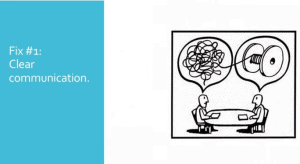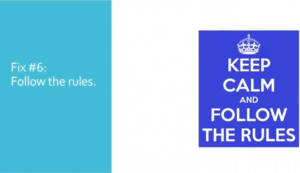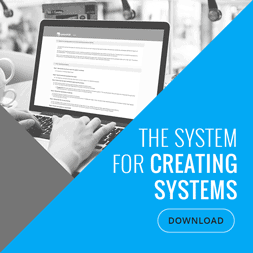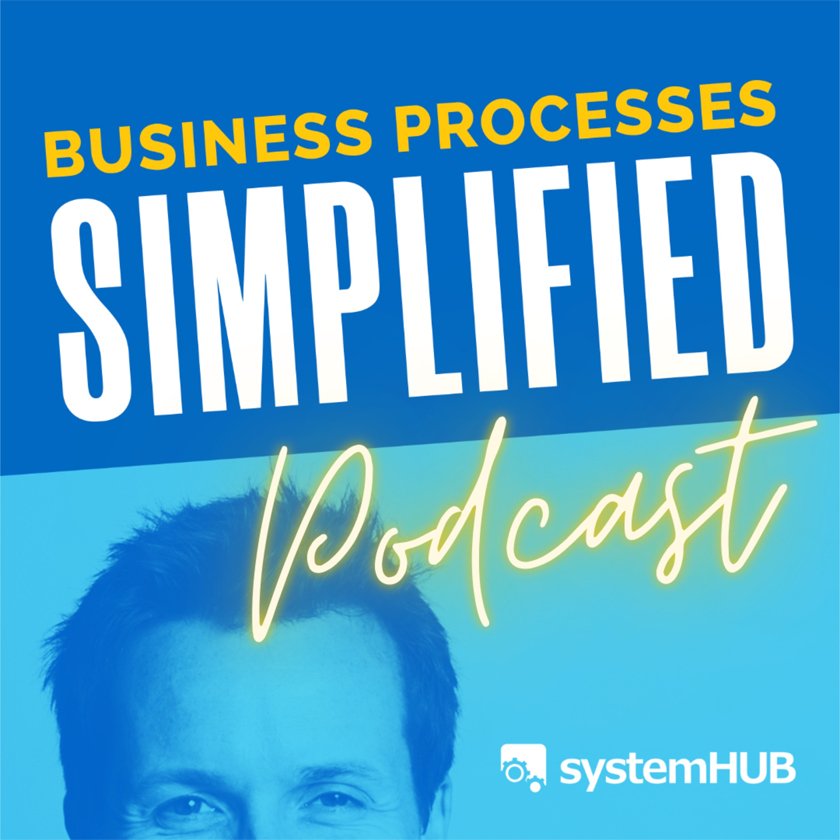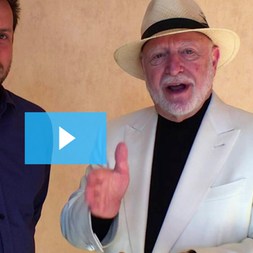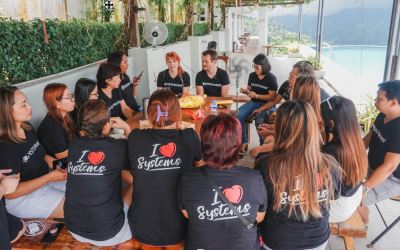Your business growth is dependent on how well you implement systems to solve the problems. These systems tackle the issues without you having to be there. To start with your own systems, sign up for your free systemHUB trial here.
Video transcript:
Let’s start putting the fires out. How did I help? Number one, remember unclear communication, a time to get clear. It’s time for the information that was coming from Dave to his team member to make sense.
This is obviously after understanding Dave as I do, and understanding the business, the number one thing I thought we needed to do was we needed to define some roles in here.
You can take notes throughout, this would be helpful information. You might think, defining roles. Yes, I’ve got a sales and marketing manager, I’ve got an assistant. I don’t mean that. I mean define roles as in what are your team members who you have now, whether they’re here or overseas, what are their core skill sets? What is that in?
Ask them. They might actually have skills you didn’t know anything about when they applied foe the job. They might have applied for the job as a graphic designer or a coder or a retail assistant. But they might have skills that are beyond that which you can use. So defining the role is really important.
The reason is it no longer became a matter of who was the delegator and who was the doer. Dave was rapid firing instructions to people just hoping it would get to where it needed to go. But if you have a clear idea of who the delgators are, and I believe it has previously been explained how you’ve got your top tier staff and then you’ve got your other chess pieces underneath, if you know who your doers and your delegators are, Dave can say, I need to get this done now, to the delegator.
The delegator knows all of the roles, they know who does what, they know what their specialties are. They can quick fire that off to the right person. It’s like creating a filter between the ideas person and the team. If necessary, get someone like myself in to become that filter. That may have to happen to calm the waters.
David: I just wanted to add something with this one in particular. Another thing you did was we put a system together for delegating work. Inside our project management tool, Asana, we have a process listed out on how work needs to be assigned. I passed it to Melissa, or whoever was going to feed it through to the team and assigned it to the right person. The process lists how that needs to be delegated, to make sure that the assistant who reads it isn’t getting a half baked task on how it is done. That was another really good one you put in place.
Melissa: Thank you. Number two is defining the deliverables. That means no more: can do everything. It’s not just about saying: can do everything because maybe down the track you want to do everything. When I say define deliverables, I don’t mean just create a list of things that you do. When you write down everything that your business offers or the products that you sell, you should think about everything you don’t do.
What are the exclusions from your product and service list? Where is the opportunity in knowing what you don’t do? Up sells, tack on things at the end. Maybe during the process you say, this service includes this, but it doesn’t include this. If you want that done, tick that box. So it’s important to know what your services don’t include for the price.
In order for you to grow, you need to know what you do right now, what that includes and what you don’t include. When you list what you don’t include, maybe that is something you can do down the track. Or maybe that is something you can do right now and you just never thought about it. You say, how am I going to do that? You just go off and find someone who can do that service. Then you’ve got another thing you can up sell to someone.
David: The other thing you got me to do was starting to say no to a lot of clients. We’d have clients who would reach out and say can you do this? If it didn’t fall exactly into one of the packages, I’d say, you’re going to have to chat to Melissa first. They’d have a phone call with Melissa and Melissa would say, no, sorry that doesn’t fit into a package. It’s something we can’t help with, or you can hire us by the hour or you can go talk to this person over here. We started saying no.
Melissa: What is the benefit of saying no to that? You free up more time, don’t you? You’re not spending time trying to reinvent the wheel that someone else is an expert at. Let them do it. Do what your core skill set is about. Do what your business was built to do.
David: We found certain clients were sucking out all of my team’s time. So some squeaky wheels were taking so much of the team’s time and other clients were just really easy to work with. We had very clear deliverables on what we were giving them. So it was a better experience for them and it was a better experience for us.
Melissa: Fix number four, you remember the pile of books? We started to stack them up and organise them. It was time to go through all the systems Dave had. Bring all of them to the table and let’s have a look and see. Not only that, it wasn’t just about getting them organised, it was filling them out. Are they up to date? How do they connect with one another?
It’s one thing, like I said, to have all these great systems, but perhaps you have systems that are within systems that are within systems. It sounds complicated but it really isn’t when you have an organised place to put them. It’s very easy to go from system number one to system number two to system number three when you have the organisation around it.
Like I said, we had started with role training. Everyone had their roles defined, they knew what they needed to do. Dave knew the core skill set of his team members, each individual one of them and he had some beginnings of systems. Say for example we had someone who was keyword research, that was their core skill set. We said, you, keyword research team member, you are now attached to the keyword research system. Look through it, make sure it works right, you’re in charge of that now.
Any services that we didn’t have systems for, we assigned to the appropriate team member who had the skill set. We said, make the system for it and the next time you do that, document it, do screen shots, screen capture your computer. Make little notes as you go.
The systems started naturally filling themselves out. Though that, they got unified in a single spot that we call SystemHUB and so the team can continuously go back to it, tweak it and operate from it. So each team member has systems that they do, so they’re in charge of making them, not you.
Fix number four was the staff on boarding, training. As you all know, Dave is a nice guy. As I said before, we had staff coming on and they weren’t always sure where they fit. They didn’t really know how things were meant to go. So we had to make systems the same for every single staff member.
Now granted each staff member would have a different role specialty that they would do. Someone who works with you in the office is going to be very different to someone who is outsourced in the Philippines. But there are still some similar culture from your business that has to be trained from the get go. There are things like your staff handbook. What are you policies and procedures? What is your vision? How do you apply for leave? All of that sort of thing needed to get documented and put into place.
It was really amazing when you put staff on boarding into place, watching how people go through that staff on boarding. Put your old team members through it too. We did that. Oh, we can’t have to do training, I’ve been here for four years. Yes, training again. Once it all got done, training again. What was really amazing was how all the winners floated to the top and the stragglers, that dead weight became very obvious. All of a sudden you realized who was really following the systems and who wasn’t.
David: With that one, we did go through the process. You need to do it for the good of the business to fire staff when they’re not right, they’re not the right cultural fit, they’re not following the systems. It’s hard but you have to think in terms of the larger organisation. The stronger Melbourne SEO and Video is, the more people we can help support.
If we’re having to carry people, that’s actually doing a disservice to the impact we can have. So when we recognized some people weren’t quite fitting into the culture and the way we were heading as we moved into this new category, we needed to let them go. We let them go and find something that was more suitable for them.
Melissa: This was a hard process for Dave because he is a super nice guy. So letting staff go is not one of his strong points.
We extinguished all of these fires. We’re doing really well and then I would find all of a sudden Dave what are you doing there? He’s micromanaging still. Old habits die really hard, don’t they? When you’re so used to running everything, how hard is it going to be let go and let someone else do it? They don’t do it like you do it.
That’s when systems come into play. You write down what you want them to do and they need to follow that system. So there is going to be some teething of course because no one is every going to do it as well as you, you think. But I said to Dave, it’s time. There’s a track now. There are systems in place. Let your team roll with it. Empower them again.
The whole reason you started the business to begin with was to have more freedom. Micromanagement is the complete opposite of that. So we had to squash that and Dave was really good. Dave was very accommodating. I said, Dave, you’re doing it again. He would stop and pull back and we would have to just work though it. There was a little teething process but it was really effective.
David: The other thing was I would send communication through email. Can you do this or can you do that? I still do it. Melissa, if she was cc’d in, would say, Dave, you know you should be delivering all of this communication in Asana. We need to have a central place where all communication is documented. That way if team members come and go from a particular project, there is a central thread where we could follow what actually happened.
There is nothing worse than someone saying something on Skype and then saying, oh, but I chatted with Dave and he said this. That was because I was Mr Nice Guy and then I’d find the exception. Now I need to be much more rigid and so no, all communication needs to go through Asana.
Fix number six was following the rule. I know Dave you remember these conversations and we had these back when we had Planet 13. Your business is bigger than you. Unless you like staying in the box that you’re in, where you are right now, you need to think of your business as bigger than you. If you’re going to pop in from time to time, like Troy does in his business, and is’t sure where things are, you need to follow the rule.
You are at the helm, remember? You’re the person at the front.
Just because you’re the business owner doesn’t mean that you can break the rules because you can. If you’re going to set that example and let your staff automate, run your business, give you the freedom that you wanted from the beginning, then you should follow the rules too. You should be a great example.
David: That one was really easy for me because one of my core philosophies is you need to be the best example of what you teach. That is something I think everybody should take on board. You need to lead by example for your team. There is no way that you can tell someone to do something in your team if you’re not prepared to do it yourself and you find exceptions and break the rules.
Even running this event is fantastic because it is driving us again to look at the way we’re doing systems and get better and better. There’s nothing like teaching it. Now we need to level up the way we do systems because I’m out there saying, this is what we’re doing, here’s how we’re doing it.
Melissa: So now we’ve got all these fixes and we’ve implemented all these. There are only six. You have probably got a lot longer list than that. I can honestly say, I know from conversations with Dave that just putting these into place let him experience the kind of freedom his business never allowed him before.
Little Nate came along, he got married. Wouldn’t you like to spend that time with your family and your friends or just run off in the middle of nowhere one day and just go off the grid or whatever?
David: I ran a little experiment. I booked myself in for an eleven day meditation retreat in New Zealand where you don’t talk, you don’t use any internet. You’re not in touch with the outside world. You go completely inside. The course is called Vipassana. If you do something like that as a business owner,. It’s a way to force yourself to completely separate. Then the business has to survive without you. That was a really a good step for me as a business owner.
Melissa: There are a couple of grey hairs on you from that I’m sure. Right now, again, in your workbooks there is a section where I would like you to maybe have a think about were any of the six fixes that I helped Dave with, would they be able to help you in your business now? Are there any spots you think you can look at and say, that makes sense? I should probably put that into place.
Do you have clear deliverables? Do you have staff on boarding which is not just hello, welcome to the team. Do you have actual step by step training? Have a think about some of those fixes. How would that change your life if you put just one into place?
Saying NO to one thing means you are saying YES to something else that you can direct your attention to. Just like saying YES to clients that align with your core skills and values. Are you choosing the right option to say YES to? Get started with your systemHUB free trial here.
